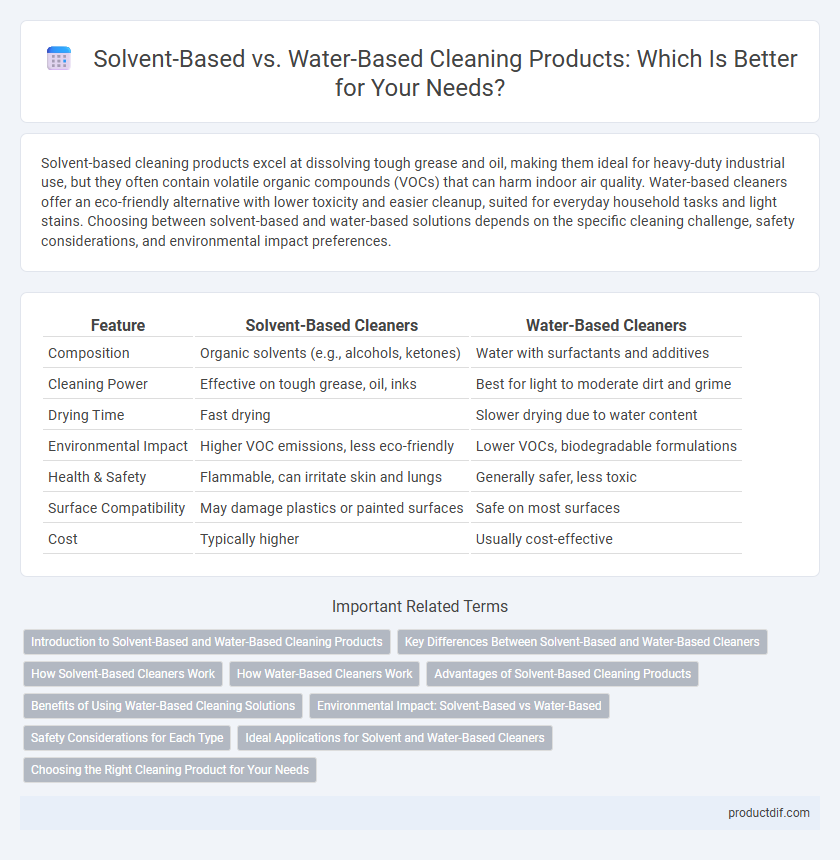Solvent-based cleaning products excel at dissolving tough grease and oil, making them ideal for heavy-duty industrial use, but they often contain volatile organic compounds (VOCs) that can harm indoor air quality. Water-based cleaners offer an eco-friendly alternative with lower toxicity and easier cleanup, suited for everyday household tasks and light stains. Choosing between solvent-based and water-based solutions depends on the specific cleaning challenge, safety considerations, and environmental impact preferences.
Table of Comparison
| Feature | Solvent-Based Cleaners | Water-Based Cleaners |
|---|---|---|
| Composition | Organic solvents (e.g., alcohols, ketones) | Water with surfactants and additives |
| Cleaning Power | Effective on tough grease, oil, inks | Best for light to moderate dirt and grime |
| Drying Time | Fast drying | Slower drying due to water content |
| Environmental Impact | Higher VOC emissions, less eco-friendly | Lower VOCs, biodegradable formulations |
| Health & Safety | Flammable, can irritate skin and lungs | Generally safer, less toxic |
| Surface Compatibility | May damage plastics or painted surfaces | Safe on most surfaces |
| Cost | Typically higher | Usually cost-effective |
Introduction to Solvent-Based and Water-Based Cleaning Products
Solvent-based cleaning products use organic solvents like alcohols, ketones, or hydrocarbons to dissolve grease, oil, and stubborn residues, making them ideal for heavy-duty industrial cleaning. Water-based cleaning products rely primarily on water mixed with surfactants and detergents, offering a safer, environmentally friendly option for everyday cleaning tasks on surfaces such as glass, tile, and painted walls. Understanding the chemical composition and application areas of solvent-based versus water-based cleaners helps in selecting the appropriate product for effective and safe cleaning outcomes.
Key Differences Between Solvent-Based and Water-Based Cleaners
Solvent-based cleaners use organic solvents to dissolve grease, oil, and heavy dirt, offering strong cleaning power but often emitting strong odors and VOCs that require proper ventilation. Water-based cleaners primarily rely on water mixed with surfactants and detergents, making them safer, environmentally friendly, and suitable for light to moderate cleaning tasks. Key differences include their chemical composition, environmental impact, evaporation rates, and suitability for various surfaces and applications.
How Solvent-Based Cleaners Work
Solvent-based cleaners dissolve oils, greases, and other hydrophobic substances by breaking down molecular bonds, making them highly effective for heavy-duty cleaning tasks. These cleaners typically contain volatile organic compounds (VOCs) that evaporate quickly, leaving surfaces dry and residue-free. Their ability to penetrate tough contaminants makes them ideal for industrial equipment, automotive parts, and surfaces contaminated with adhesive residues.
How Water-Based Cleaners Work
Water-based cleaners leverage the universal solvent properties of water to dissolve and lift away dirt, grease, and organic residues effectively. These cleaners often contain surfactants that reduce surface tension, enabling water to penetrate and emulsify stubborn grime. Water-based products are preferred for eco-friendly cleaning due to their low toxicity and biodegradability, making them safer alternatives to solvent-based cleaners.
Advantages of Solvent-Based Cleaning Products
Solvent-based cleaning products offer superior effectiveness in dissolving oils, greases, and stubborn residues, making them ideal for industrial and heavy-duty cleaning tasks. Their rapid evaporation rate ensures faster drying times, reducing downtime in commercial operations. Additionally, solvent-based cleaners often provide better penetration into porous surfaces, enhancing overall cleaning efficiency.
Benefits of Using Water-Based Cleaning Solutions
Water-based cleaning solutions offer superior environmental safety due to their low levels of volatile organic compounds (VOCs), reducing air pollution and health risks. These solutions are typically biodegradable and non-toxic, making them suitable for sensitive surfaces and safe for use around children and pets. Their easy cleanup with just water eliminates the need for harsh chemicals, promoting sustainable cleaning practices in both residential and commercial settings.
Environmental Impact: Solvent-Based vs Water-Based
Solvent-based cleaning products often contain volatile organic compounds (VOCs) that contribute to air pollution and pose health risks, leading to stricter regulations and environmental concerns. Water-based cleaners generally have a lower environmental impact due to reduced toxicity, biodegradability, and minimal VOC emissions. Choosing water-based products supports eco-friendly practices by minimizing hazardous waste and promoting safer disposal methods.
Safety Considerations for Each Type
Solvent-based cleaning products often contain volatile organic compounds (VOCs) that pose inhalation and flammability risks, requiring proper ventilation and protective equipment during use. Water-based cleaners typically have lower toxicity and less environmental impact, making them safer for indoor applications and reducing skin irritation hazards. Understanding the chemical composition and usage guidelines ensures safe handling and effective cleaning outcomes with either solvent or water-based solutions.
Ideal Applications for Solvent and Water-Based Cleaners
Solvent-based cleaners excel in dissolving oils, greases, and heavy-duty residues, making them ideal for industrial machinery maintenance, automotive parts cleaning, and paint removal tasks. Water-based cleaners are suitable for light to moderate cleaning jobs such as removing dirt, dust, and mild stains from surfaces like glass, ceramics, and painted walls, offering environmentally friendly and non-toxic advantages. Selecting the appropriate cleaner depends on the surface type, residue composition, and environmental safety requirements.
Choosing the Right Cleaning Product for Your Needs
Solvent-based cleaning products excel in removing grease, oil, and tough stains due to their powerful chemical composition, making them ideal for industrial and heavy-duty cleaning tasks. Water-based cleaners provide a safer, eco-friendly alternative with lower toxicity and easier rinsing, suitable for everyday household cleaning and sensitive surfaces. Selecting the right product depends on the cleaning environment, material compatibility, and desired safety or environmental considerations.
Solvent-based vs Water-based Infographic

 productdif.com
productdif.com